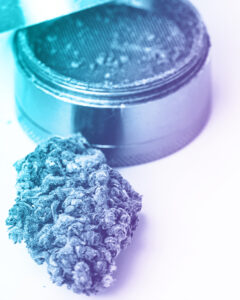Marijuana Detection Time
You have always been a rebel type, rebuking your mom and her rules since your dad left. You were only 8 years old, but the scar still hurts to this day. Your mom seemed to take it out on you, constantly yelling and always starting fights with you. While you have a male role model in your favorite English teacher, you still raise hell and refuse to condone “the system.”

Your buddies liked to get high, and you were always right there with them. Weed was an escape from the fighting and the toxicity in your house. But your mom finally cracked down, threatening you with a drug test if you didn’t get it together. She even said she would throw you out. Even though you were 21, you weren’t ready to live alone. You wondered if you stopped using weed, would it be out of your system by the time your mom tested you? How long does marijuana stay in the system, anyway?
In Hillsborough County, 30% of students admitted to using an electronic vapor device with marijuana oil during the year 2022. At Clean Recovery Centers, we understand the pressures put on students today. Our program offers housing at each of our locations to support a healthy living space. This is especially helpful for those who have not had consistent or welcoming living arrangements. Our blog is a free resource to help loved ones understand addiction, and what it means for the person facing it. Today, we are discussing the marijuana detection time and how long it stays within the body.
How Your Body Metabolizes THC
Tetrahydrocannabinol – commonly known as THC – is the chemical in marijuana that produces the feeling of being “high.” Many states, including Florida, have legalized marijuana products containing THC for medical purposes. THC can relieve nausea and vomiting, often seen in those receiving cancer treatments.
THC is a lipid-soluble chemical compound, meaning it binds with fat. This increases the amount of time it takes to eliminate it from the body. Those who frequently use THC typically take longer to metabolize it. The liver is responsible for metabolizing and eliminating THC, and some factors can affect the length of time it can complete the process.
Most THC (65%) is excreted through feces, while only 20% is excreted through urine. However, there are 18 acidic metabolites of THC that are detectable in urine. Because THC is lipid-soluble, it can re-absorb in the kidneys, increasing the detection time length.
How Long Does Marijuana Stay in Your System?
Several factors play into how long marijuana stays in your system, but the more you use it, the longer it will be detectable. Different test types are more effective for marijuana detection while others only have a small window. These are the most common types of marijuana tests.
Saliva Test
Saliva tests are not used very often for marijuana detection. This is because they can only pick up very recent marijuana use, only within a few hours. However, if marijuana is smoked or eaten, the window may extend to around 24 hours.
Urine Test
Urine drug screens are the most common when testing for substances including marijuana. They come in 5-panel, 10-panel, and 12-panel, all of which test for the presence of weed. However, urine detection times can vary widely. In those who occasionally use marijuana, presence in the urine ranges from 1 to 5 days. Those who frequently use marijuana have a longer detectable window, ranging from 15 to 30 days. Factors can affect the range, but chronic THC users stay detectable longer through urine tests. The Substance Abuse and Mental Health Services Administration (SAMHSA) has a threshold of 50ng/mL to be consistent with heavy marijuana use through urine testing.
Hair Test
Hair tests are not commonly used as they can be expensive, but they are helpful in detecting long-term use of substances. THC can be detectable in hair up to 90 days after the last use. However, when it comes to testing for marijuana in hair, it is the transfer of oil from the skin that detects its presence. Hypothetically, a person could come in contact with a THC user and pick up this oil, creating a false positive. Hair tests are more common for other substances such as opioids as opposed to THC.
Blood Test
Blood tests for marijuana are not the best representation of use. When THC is smoked, it peaks concentration in the blood around 8 minutes, with one compound still being detectable after 80 minutes. Within 4 hours, THC was no longer detected in the blood. When THC is eaten, the detection time increases by 1 to 2 hours, but overall, blood tests can only detect marijuana for around 6-8 hours.
Factors That Impact How Long Weed Stays in Your System
 As we mentioned, many factors can affect how long marijuana stays in your system. These include:
As we mentioned, many factors can affect how long marijuana stays in your system. These include:
Nature and sensitivity of the test – some tests are more sensitive than others. Urine tests especially can range in sensitivity, and some employers may accept THC levels that are low.
Frequency and dose – the longer you use marijuana, the longer it will stay detectable. Also, recreational marijuana is illegal in Florida. This means that weed is most likely coming from unreliable sources, and there is no way to know how much THC each batch or product contains. Drug screens are specifically looking at THC concentrations within the body, and not knowing how much you consumed can affect results.
Body fat percentage – THC binds to fat and is stored. The higher the body fat percentage, the longer THC will be detectable.
Gender – men tend to have a lower body fat percentage than women, meaning women process THC at a slower rate. This is generic and not always true.
Metabolism – those who have a slower metabolism will have weed in their system longer. While diet and exercise can help maintain a healthy metabolism, they can also increase the spelling of THC. Burning fat storage results in more detectable marijuana being released.
Can I Get Marijuana Out of My System Faster?
There are no ways to get marijuana out of your system faster. While certain practices can help, such as exercising and hydrating, you can still be detectable for THC. Burning fat cells through exercise is the best way to release stored THC, but it can also cause spikes in levels. Stopping marijuana use and committing to a healthy diet and exercise routine are the best ways to reduce levels within the body. However, for the avid user, this process can still take around 30 days to complete.
Can I Still Pass a Drug Test?
If you know that you are receiving a urine screen for a job or school and have used marijuana within 30 days, the chances of passing the drug test are slim. While marijuana has shown benefits for medical reasons, it is still illegal to use recreationally. If you are concerned with an upcoming drug test, refrain from drug use. That is the best option for passing a drug test.
Getting Treatment for Weed Addiction in Tampa, FL
Marijuana has a bad reputation, but many medical situations benefit from its existence. However, if you find yourself unable to stop using even when you want to, there is help available. Marijuana addiction is a condition that plagues many, and finding the resources to stop can be difficult. Addiction treatment is based on guided therapy, skill-building, and wellness components so you are able to address the root causes of your addiction. Weed may seem to have control, but you are stronger and can overcome the adversities it may have shown you. Don’t wait to find your success in recovery.
If you or someone you love is in fear of drug screens because of marijuana use, help is just a phone call away. Clean Recovery Centers treats all of our clients with respect and dignity while helping them achieve their recovery goals. Our program offers mental health treatment alongside marijuana addiction treatment, and we even provide care for mental health as a primary diagnosis. Call us today at (888) 330-2532 to learn more about our program.
Get clean. Live clean. Stay clean.


